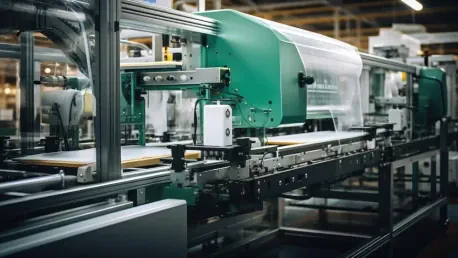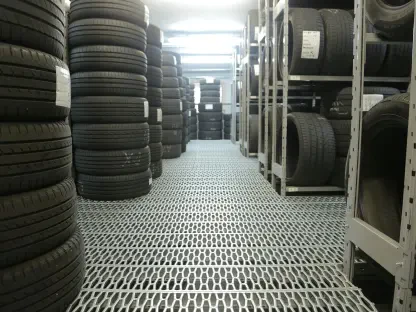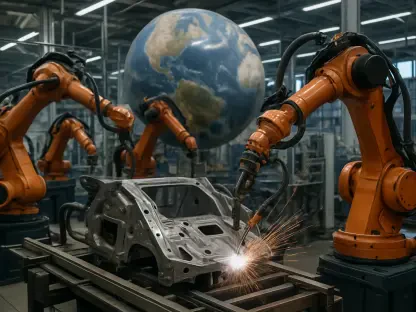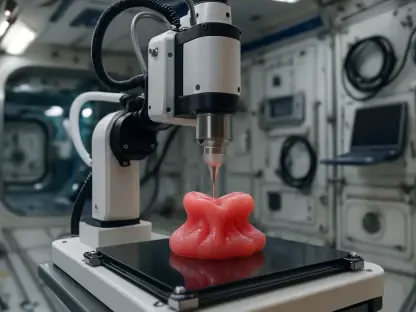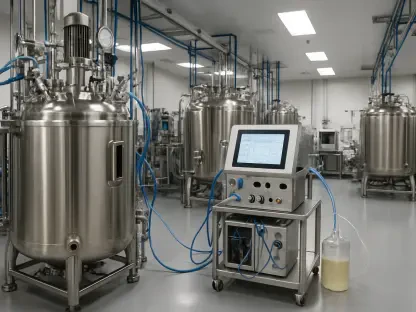The machine tools market is witnessing an unprecedented boom, fueled significantly by technological innovations. As industries like automotive and aerospace ramp up their production capabilities, advanced machine tools are becoming essential. This article delves into the factors propelling the market’s growth, technological advancements, and the influence of regional dynamics.
Technological advancements have dramatically transformed the machine tools market, turning it into an arena of rapid innovation and efficiency. Central to this transformation are Computer Numerical Control (CNC) machines, which have revolutionized manufacturing processes by enabling precise and efficient production. These machines minimize human error and maximize output quality, making them indispensable in various high-precision industries. The advent of smart manufacturing and Industry 4.0 further cements the role of technology in this market. By integrating data analytics and Internet of Things (IoT) capabilities, these technologies facilitate real-time monitoring and improve operational efficacy, providing manufacturers with a competitive edge. Additionally, the push toward automation has emerged as a pivotal factor. Automated systems not only enhance productivity but also reduce labor costs, making it an attractive proposition for industries aiming for higher efficiency and cost-effectiveness.
The Role of Technological Advancements
Technological advancements have become the backbone of the machine tools market. With the introduction of CNC machines, manufacturing processes have seen transformative changes. CNC machines enable precise and efficient production, minimizing human error and maximizing output quality. These machines are crucial for sectors that require high precision, such as automotive and aerospace, where the margin for error is exceedingly narrow. Smart manufacturing and Industry 4.0 are other critical technological trends impacting the market. These technologies facilitate real-time monitoring and improved operational efficacy by integrating data analytics and IoT capabilities. Manufacturers are increasingly adopting these innovations to stay competitive and meet the demands of high-precision industries.
Moreover, the push toward automation has been pivotal. Automated systems not only enhance productivity but also reduce labor costs, making it an attractive proposition for industries aiming for efficiency and cost-effectiveness. This makes automation a critical driver of the machine tools market growth. For instance, automated CNC systems can operate continuously without the need for breaks, thus significantly increasing production rates. The ability to automate repetitive tasks also frees up human workers to focus on more complex and value-added activities, thereby optimizing the overall workflow. Furthermore, the integration of artificial intelligence (AI) and machine learning algorithms into these automated systems is enhancing their capabilities, allowing for predictive maintenance and better quality control.
Sectoral Demand: Automotive Industry
The automotive industry stands as one of the foremost drivers of demand for machine tools. The shift toward electric vehicles (EVs) has especially catalyzed this demand. EV production requires specialized machine tools to manufacture components like battery packs and electric drivetrains, which are integral to these vehicles’ functionality. In 2022 alone, electric vehicles accounted for over 14% of global vehicle production. This substantial share underscores the increasing reliance on advanced machine tools to meet specific manufacturing requirements. The automotive industry’s perpetual evolution continues to spur investment and innovation in machine tool technologies.
Additionally, the broader automotive landscape, including traditional internal combustion engine (ICE) vehicles, still necessitates high-precision parts. Components such as engine blocks, chassis, and transmission systems depend on high-quality machine tools for manufacturing, ensuring the sector remains a cornerstone of market demand. The drive for lightweight materials to improve fuel efficiency and comply with stringent emission norms has also heightened the need for advanced machine tools capable of working with sophisticated materials like aluminum and carbon fiber. Moreover, the trend toward automation within automotive manufacturing plants further fuels the demand for cutting-edge machine tools, making this sector a vital market driver.
Aerospace Industry Contributions
The aerospace sector’s contribution to the machine tools market cannot be overstated. This industry demands exceptional precision and quality, especially when working with advanced materials like titanium and carbon composites. These materials require specialized machining capabilities that only advanced machine tools can provide. The resurgence in global air travel, which saw an over 30% increase in 2023, has driven the need for more aircraft. This surge aligns with increasing aircraft production, thereby escalating the demand for machine tools tailored to aerospace manufacturing. The need for stringent quality and precision in aerospace components further emphasizes the indispensable role of advanced machine tools.
Moreover, technological progress in the aerospace field presses on the need for continuous innovation in machine tools. As aerospace designs become more sophisticated, the tools required to produce these designs must also evolve, ensuring this sector remains a pivotal market growth driver. For example, the use of 5-axis CNC machines allows for the intricate and precise machining of complex aerospace components, which traditional machines cannot achieve. Additionally, the push for fuel-efficient aircraft has necessitated the use of lightweight and high-strength materials, further driving the need for specialized machine tools that can handle these advanced materials without compromising on quality or precision.
Market Projections and Segments
Market projections indicate a robust growth trajectory for the machine tools market. Starting at USD 106.55 billion in 2023, the market is expected to reach USD 189.44 billion by 2032, growing at a Compound Annual Growth Rate (CAGR) of 6.65%. Such optimistic projections highlight the market’s expansive potential and evolving dynamics. The metal cutting segment dominates, accounting for over 77.4% of the market share in 2023. This segment includes various machines essential for removing excess material and shaping parts to precise specifications. High demand in sectors like automotive and aerospace ensures this segment’s dominance.
Similarly, CNC technology represents a significant market portion, holding an 86.2% share in 2023. The efficiency, precision, and versatility offered by CNC machines make them indispensable across multiple industrial applications, underscoring their vital role in market growth. These machines are not only used for cutting but also for milling, drilling, and even 3D printing, making them highly versatile and essential for modern manufacturing processes. The growing adoption of CNC technology across various sectors, including electronics and medical devices, further drives the market’s expansion, highlighting the technology’s broad applicability and indispensability in high-precision manufacturing.
Regional Influences: Asia Pacific and North America
Regional dynamics reveal that Asia Pacific leads the machine tools market, capturing over 55.80% of the share in 2023. The region’s dominance is supported by a booming automotive industry and substantial investments in commercial aviation and defense. Countries like China, Japan, and South Korea are at the forefront, driving significant demand for advanced machine tools. The presence of numerous leading machine tool manufacturers and the increasing adoption of automation technologies in these countries further bolster the market’s growth. Additionally, government initiatives aimed at industrial modernization and technological advancement are also contributing to the region’s market leadership.
North America presents a significant market growth opportunity. The region’s established infrastructure for EV production and strong automotive presence contribute to this potential. Major manufacturers in the US and Canada are increasingly investing in advanced machine tools to maintain their competitive edge. The push for innovation and automation within these industries is driving substantial demand for high-precision and efficient machine tools. Moreover, the aerospace sector in North America, particularly in the United States, continues to be a major contributor to the market, with significant investments in advanced manufacturing technologies aimed at increasing production efficiency and reducing costs.
Beyond Asia Pacific and North America, emerging markets in Southeast Asia, Latin America, and Africa are also showing promise. Industrialization in these regions is creating new growth avenues, presenting opportunities for market expansion beyond traditional strongholds. The increasing focus on infrastructure development and manufacturing capabilities in these regions is driving demand for advanced machine tools. Government initiatives and foreign investments are further bolstering the industrial landscape, making these emerging markets attractive prospects for machine tool manufacturers. As these regions continue to industrialize and modernize, the demand for advanced and automated manufacturing solutions, including machine tools, is expected to grow significantly, presenting new opportunities for market players.
Future Growth Indicators and Recent Developments
Several indicators highlight future growth in the machine tools market. Advances in automation and smart manufacturing promise innovative solutions for increased efficiency. Integrating Industry 4.0 and IoT capabilities further enhances manufacturing operations, allowing for greater precision and productivity while reducing costs and downtime. AI-driven predictive maintenance also boosts reliability and performance, contributing significantly to market expansion.
Sustainability is emerging as a critical focus. Emphasizing environmental responsibility drives the demand for energy-efficient machine tools that align with global sustainability goals. Efforts to minimize energy consumption and lower emissions are leading to the development of eco-friendly technologies and materials. This focus on green manufacturing is not only meeting regulatory standards but also responding to consumer demand for environmentally responsible products, which is expected to further propel market growth.
Recent developments underscore the dynamic nature of the machine tools sector. Notable innovations include DMG Mori’s DMU 50, introduced in 2024, which features 5-axis simultaneous machining with advanced CNC technology for heightened precision. Haas Automation’s VF-2SSYT Vertical Machining Center, designed for high-speed cutting and equipped with a robust spindle and superior cooling systems, also exemplifies the technological advancements setting new industry benchmarks.
In conclusion, the rapid expansion of the machine tools market is driven by technological advancements and automation. Key sectors like automotive and aerospace have fueled this growth, leveraging innovations such as CNC technology and smart manufacturing. Over the forecast period, the market is poised for robust growth, bolstered by sector-specific needs and regional trends. The future of the machine tools market looks promising, with ongoing technological advancements and a growing focus on sustainability presenting extensive opportunities for growth and innovation.
